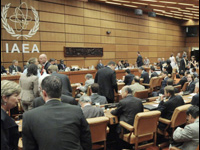{
"authors": [
"James M. Acton",
"George Perkovich"
],
"type": "event",
"centerAffiliationAll": "dc",
"centers": [
"Carnegie Endowment for International Peace"
],
"collections": [],
"englishNewsletterAll": "",
"nonEnglishNewsletterAll": "",
"primaryCenter": "Carnegie Endowment for International Peace",
"programAffiliation": "NPP",
"programs": [
"Nuclear Policy"
],
"projects": [],
"regions": [
"Middle East",
"Iran",
"Syria",
"East Asia",
"South Korea",
"North Korea"
],
"topics": [
"Nuclear Policy",
"Nuclear Energy"
]
}
Deterring Safeguards Violations
Thu, September 24th, 2009
Washington, DC
IMGXYZ1320IMGZYXThe day before President Obama revealed the existence of a previously undisclosed Iranian nuclear facility, James Acton presented a case for strengthening the nonproliferation regime by recognizing that noncompliance with safeguards agreements is a violation of the Nuclear Non-Proliferation Treaty (NPT) itself.
NPT Violations
Acton explained that the "central problem" faced by the nonproliferation regime is the "inability" of the Security Council to quickly and robustly respond when safeguards violations are discovered. One way to help address this problem would be for the international community to agree that safeguards violations constitute NPT violations.
Currently, there is no consensus on whether they do, although Article III of the NPT requires states to "accept" IAEA safeguards. The 2010 Review Conference should clarify the issue and make clear that non-compliance with safeguards does constitute non-compliance with Article III. This would not compel the Security Council to take any particular course of action, but it would make it harder for it to do nothing at all.
The Review Conference should agree that the "most serious safeguards violations" will be assumed to be violations of Article II of the NPT as well. Article II requires non-nuclear-weapons states to refrain from manufacturing nuclear weapons. NPT state parties should formally identify what violations are the most serious. Acton proposed the following, noting that it is "virtually impossible" to build nuclear weapons without committing at least one of them:
- The diversion of a significant quantity of nuclear material to an undeclared or unsafeguarded facility.
- The unilateral termination of safeguards.
- The failure to declare the construction of a uranium enrichment or plutonium reprocessing facility according to the terms laid out in the safeguards agreement
Following the event, Acton remarked that the importance of the third criteria was demonstrated by the revelation of Iran's Qom enrichment facility the following day.
2010 NPT Review Conference
These proposals are worth pursuing at the 2010 NPT Review Conference because they impose no additional obligations on non-nuclear-weapon states abiding by the rules—on the contrary, they would enhance their security.
The current impasse with Iran underscores the need to develop "structural solutions" to non-compliance problems and that the 2010 NPT Review Conference is the exactly the right forum to do this. The outcome of the Review Conference will be an important test of President Obama's new strategy to address nuclear dangers.
Country-Neutral
These proposals will help move toward a country-neutral approach to enforcement—a uniform response to safeguards violations regardless of the country involved. Acton noted that the United States has raised few public concerns about safeguards violations by its ally, South Korea, even while using international meetings such as the NPT Review Conference to highlight the violations of Iran and North Korea. "Countries need to realize," Acton said, "that it is in their own interest to enforce compliance in an even handed and non-discriminatory way."
Reporting Non-Compliance
Acton also evaluated his proposal in light of the IAEA's ongoing investigation of a Syrian nuclear reactor site destroyed by Israel in 2007. He noted that if states start taking non-compliance more seriously, they would have a greater incentive to report non-compliance to the IAEA rather than dealing with the problem through unilateral military means.
Carnegie does not take institutional positions on public policy issues; the views represented herein are those of the author(s) and do not necessarily reflect the views of Carnegie, its staff, or its trustees.
Event Speakers
Acton holds the Jessica T. Mathews Chair and is co-director of the Nuclear Policy Program at the Carnegie Endowment for International Peace.
George Perkovich is the Japan Chair for a World Without Nuclear Weapons and a senior fellow in the Carnegie Endowment for International Peace’s Nuclear Policy Program. He works primarily on nuclear deterrence, nonproliferation, and disarmament issues, and is leading a study on nuclear signaling in the 21st century.

